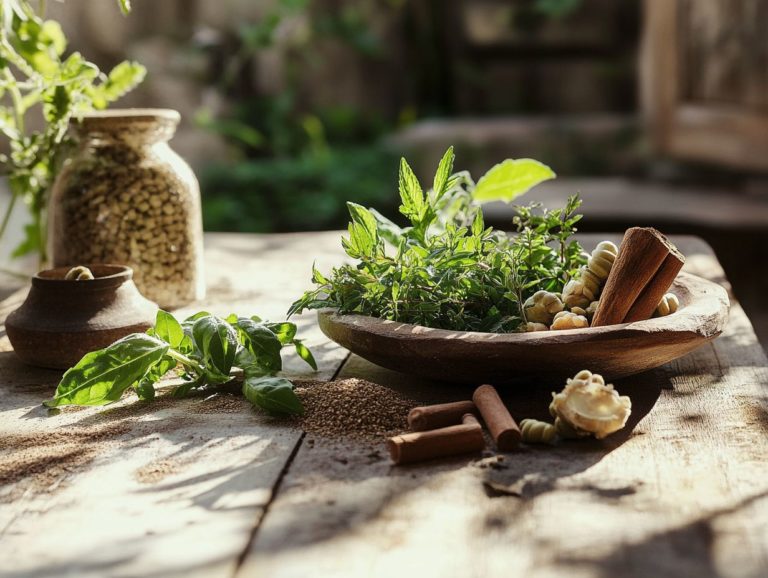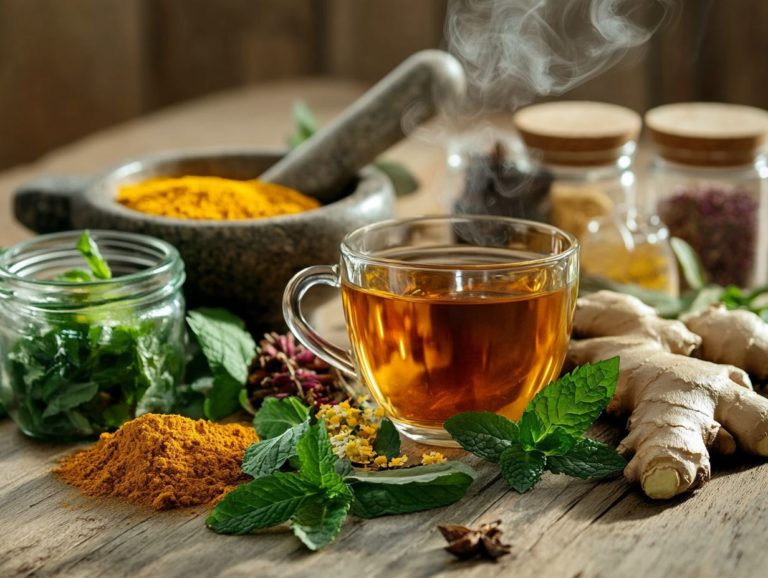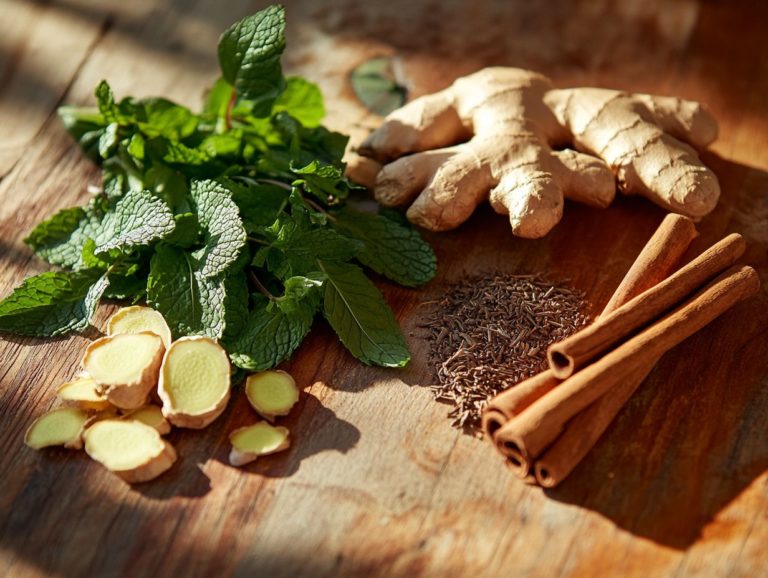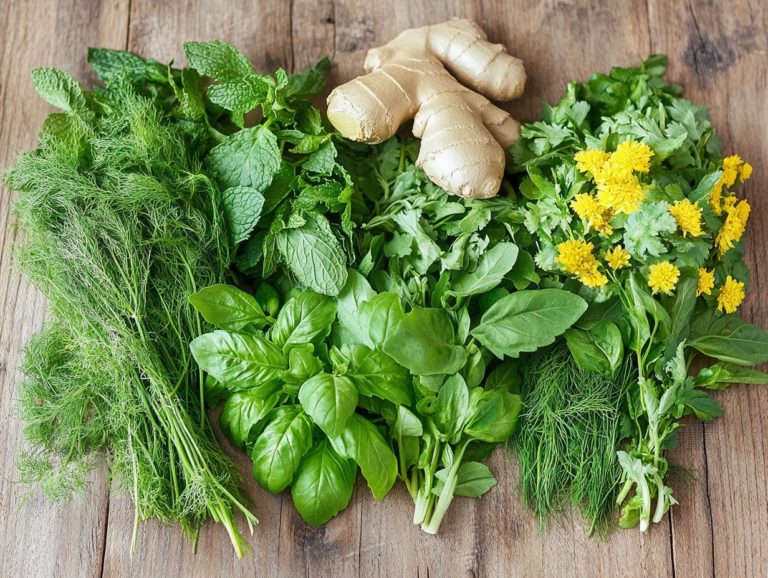Natural Remedies for Skin Infections
Skin infections can be both frustrating and uncomfortable, impacting individuals across all age groups. Understanding the types of skin infections bacterial, viral, and fungal and their causes is crucial for effective treatment.
This article delves into the advantages of utilizing natural remedies, spotlighting potent ingredients such as tea tree oil, honey, aloe vera, and garlic, as well as herbal antibiotics like St. John s wort and Cryptolepis.
Discover practical methods for application, essential precautions, and tips to maintain healthy skin that can help prevent future infections. Embrace a holistic approach to skincare and uncover how nature can aid in restoring your skin s vitality, especially when combined with natural ingredients like vitamin E and lavender oil.
Contents
- Key Takeaways:
- Understanding Skin Infections
- Benefits of Using Natural Remedies
- Common Natural Remedies for Skin Infections
- How to Use Natural Remedies for Skin Infections
- Preventing Skin Infections Naturally
- Frequently Asked Questions
- What are some common skin infections that can be treated with natural remedies?
- What are the benefits of using natural remedies for skin infections?
- Can natural remedies effectively treat severe skin infections?
- What are some common natural ingredients used in remedies for skin infections?
- Are there any potential risks or side effects of using natural remedies for skin infections?
- Can natural remedies prevent skin infections from occurring?
Key Takeaways:
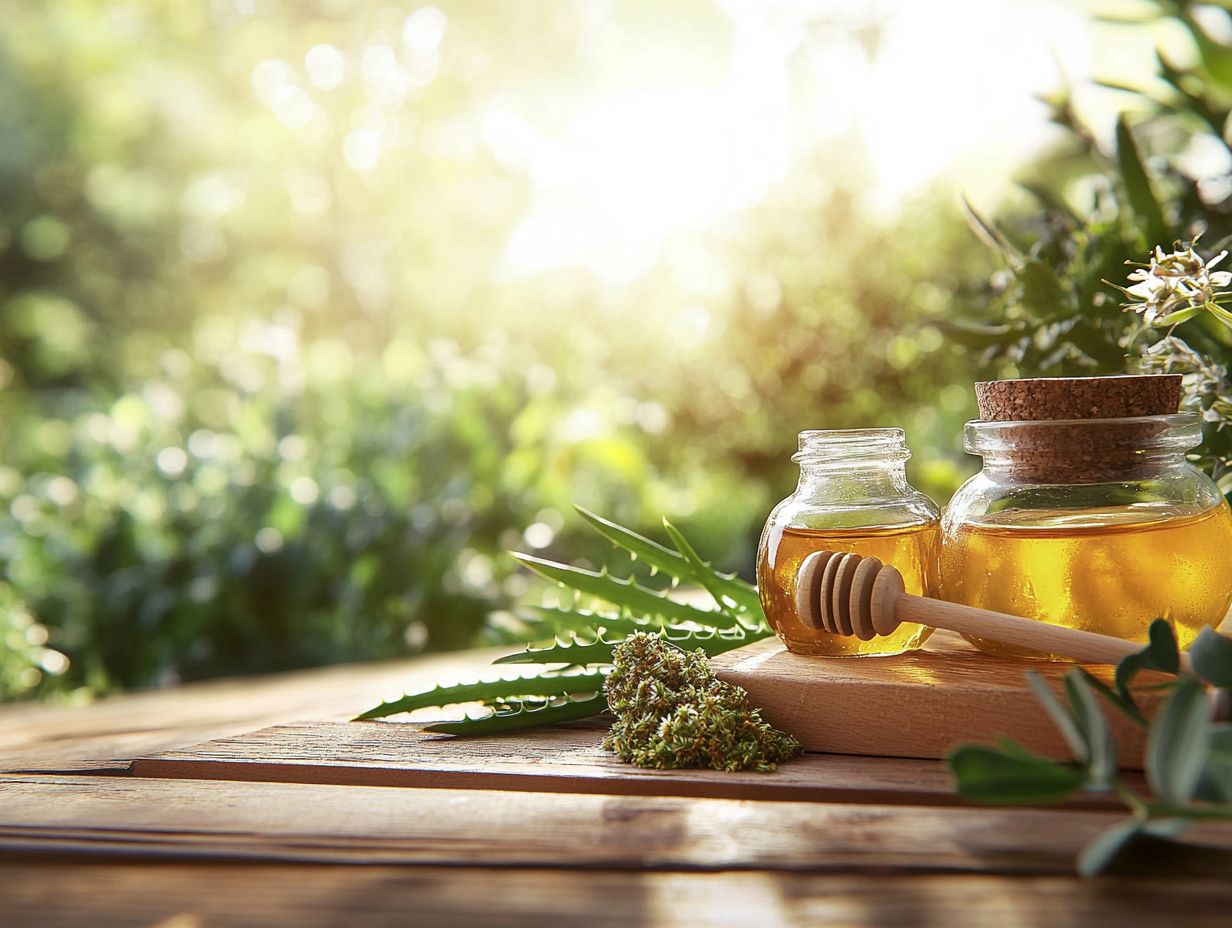
- Natural remedies can effectively treat a variety of skin infections, providing alternatives without the harsh side effects of traditional medications.
- Tea tree oil, honey, aloe vera, garlic, and turmeric paste are powerful natural ingredients with the ability to fight germs that can help fight skin infections, particularly in infected wounds.
- Incorporating natural remedies into your skincare routine and maintaining healthy skin can help prevent future skin infections and promote overall well-being.
Understanding Skin Infections
Skin infections are a prevalent health concern, stemming from a variety of skin pathogens such as bacteria, viruses, fungi, and parasites. Understanding the different types of skin infections, along with their causes and manifestations, is essential not only for effective wound care but also for averting complications like antibiotic resistance, especially in cases involving MRSA (Methicillin-Resistant Staphylococcus Aureus) and Streptococcus.
From bacterial infections like MRSA, Streptococcus, and Staphylococcus to viral and fungal afflictions like Candida, being well-informed about these conditions gives you the power to pursue suitable treatments and embrace preventive strategies, including utilizing natural remedies.
Types of Skin Infections
Skin infections can be categorized into several types, primarily based on their causative agents: bacterial, viral, fungal, and parasitic infections. Each type presents distinct symptoms and requires different treatment approaches, such as herbal antibiotics and natural remedies, to ensure effective wound care and recovery.
For instance, bacterial infections like MRSA and Streptococcus often necessitate topical antibiotics, while fungal infections such as Candida may respond well to herbal remedies for skin conditions with the ability to fight germs.
Viral infections, including herpes and shingles, as well as other common viral infections, typically show up as blisters, redness, and extreme pain, making early identification crucial for effective management. Parasitic infections, often triggered by mites or ticks, can lead to itching and inflammation, highlighting the importance of antiparasitic treatments.
Understanding the specific pathogens involved such as Staphylococcus aureus for bacterial infections or Trichophyton for fungal infections is vital for determining the right course of action. Natural remedies can play a key role in this process. Accurately distinguishing between these infections not only aids in selecting the appropriate therapies but also helps prevent complications, ensuring a quicker recovery and overall improved health.
Benefits of Using Natural Remedies
Discover the incredible power of natural remedies! They offer effective alternatives to combat skin infections, especially as antibiotic resistance rises. Utilizing natural remedies, including herbal antibiotics and dietary supplements such as vitamin E, for treating skin infections presents you with a wealth of advantages, especially in an era where effective wound care solutions are in high demand.
Herbal antibiotics like St. John s wort and Eucalyptus provide powerful antimicrobial properties. These remedies, sourced from nature, offer a holistic method for managing skin infections, making them a compelling complement to conventional treatments.
Ingredients like honey, aloe vera, and tea tree oil, as well as lavender oil and marigold, have proven their worth in addressing infected wounds, promoting skin health, and facilitating a smoother recovery.
Start exploring these natural remedies today to keep your skin healthy and infection-free!
Natural Ingredients for Treating Skin Infections
Natural ingredients possess exceptional antimicrobial properties that can aid in treating skin infections. Honey, aloe vera, and tea tree oil are well-known for their wound care benefits.
Turmeric paste, lavender oil, vitamin E, marigold, and St. John’s wort also offer impressive healing capabilities. Incorporating these DIY herbal treatments for skin irritations into your routine can speed up recovery and reduce infection risk.
Each of these ingredients provides unique benefits. For instance, honey acts as a moisture attractor, drawing moisture into the skin, and it contains enzymes that produce a substance that helps kill germs a natural antiseptic. Aloe vera is renowned for its soothing properties and promotes skin regeneration, while tea tree oil serves as a potent antifungal and antibacterial agent.
Combining these remedies maximizes their healing potential against skin pathogens. The scientific community backs these applications, citing numerous studies that validate their effectiveness. By exploring these varied options, including top herbal remedies for skin allergies, you can embrace a holistic approach to wound care that enhances not just healing but also overall skin health.
Common Natural Remedies for Skin Infections
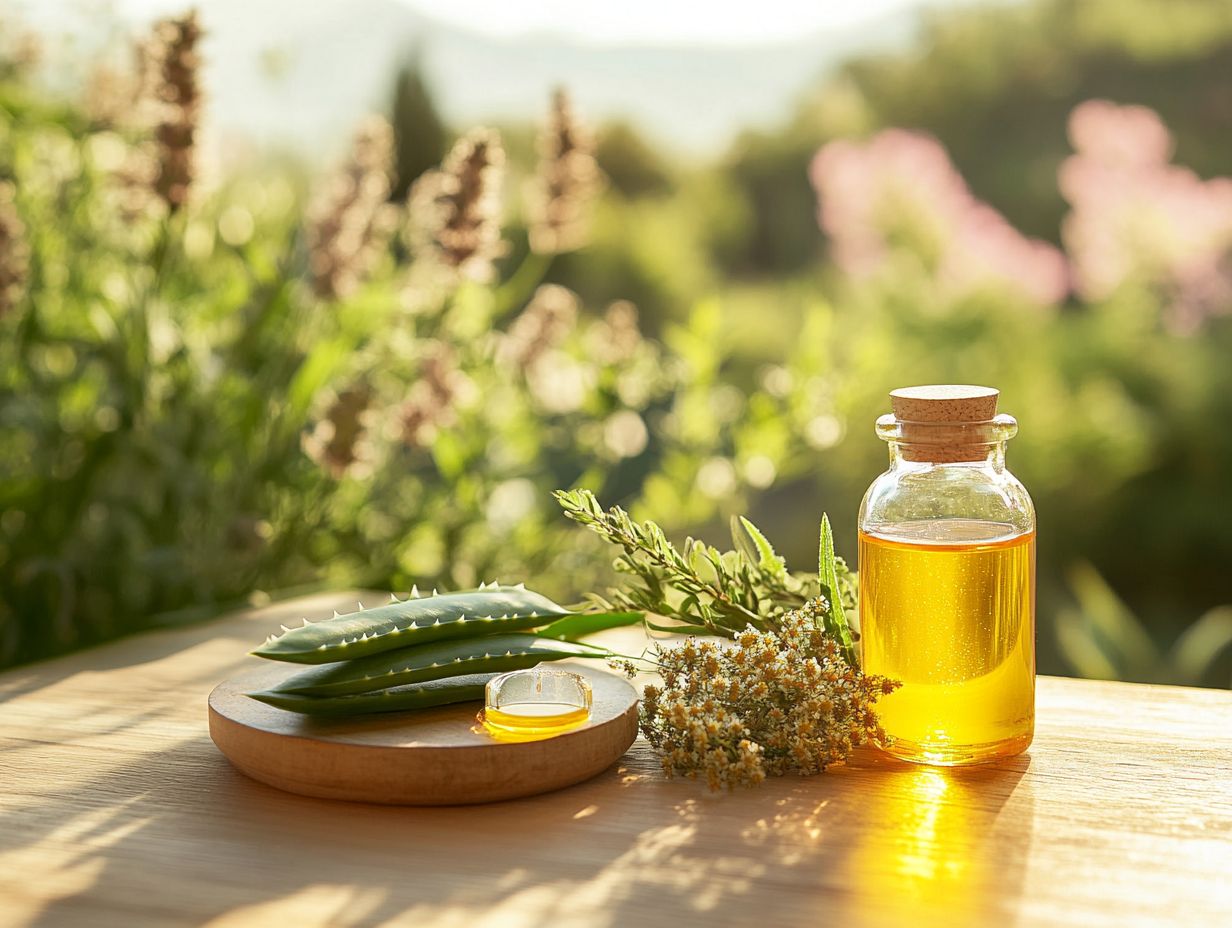
Discover the sensational power of common natural remedies like tea tree oil, honey, aloe vera, garlic, and turmeric to easily manage skin infections and promote effective wound care.
Each of these ingredients boasts distinct properties that not only support healing but also combat infection and enhance your overall skin health.
Take tea tree oil, for example; its powerful antibacterial qualities make it a go-to. Meanwhile, honey serves as a delightful moisturizer and a natural antibiotic, seamlessly blending efficacy with nature s bounty.
Tea Tree Oil
Tea tree oil stands out as a powerful natural remedy, celebrated for its remarkable antimicrobial properties that effectively tackle various skin infections. Extracted from the leaves of the Melaleuca alternifolia plant, this essential oil has a rich history of traditional use, praised for its antibacterial and antifungal effects, making it a trusted option for wound care.
For the best results, dilute tea tree oil with a carrier oil, which refers to a neutral oil used to dilute essential oils before applying to the skin, such as coconut or jojoba oil. A common ratio to follow is one part tea tree oil to about nine parts carrier oil.
Just a heads-up: be mindful of potential side effects like skin irritation or allergic reactions, so it s wise to perform a patch test before using it more broadly, especially when using essential oils like lavender oil or eucalyptus.
Research proves its effectiveness against tough pathogens, including Staphylococcus aureus, Candida species, and Cryptolepis, solidifying its position as a formidable ally against bacterial and fungal infections. When you combine it with complementary natural remedies like herbs that help with skin irritations, such as aloe vera or lavender oil, you may find yourself reaping even greater healing benefits.
Honey
Manuka honey, in particular, is celebrated for its extraordinary antimicrobial properties and has been a go-to remedy for centuries in wound care and the treatment of skin infections, especially effective against various skin pathogens. Its natural composition not only offers a soothing touch but also works to inhibit bacterial growth, including strains like MRSA, making it an invaluable ally in the world of natural healing.
Beyond Manuka, other varieties like clover and thyme honey also provide wound-healing benefits, though their effectiveness can vary. The application methods are refreshingly simple; you can apply honey directly to a clean wound or use honey-infused dressings to ensure extended contact.
Scientific studies have shown that honey can effectively tackle pathogens such as Staphylococcus aureus and Escherichia coli, highlighting its role in infection prevention. For an even more robust healing process, consider combining honey with complementary natural treatments like aloe vera, essential oils like lavender oil, or even unique herbal remedies for skin care, optimizing its overall effectiveness for those embracing holistic approaches to wound care.
Aloe Vera
Aloe vera is a remarkable natural remedy that should be in your skincare arsenal. It’s known for its soothing properties and effectiveness in treating skin infections.
Packed with vitamins and antioxidants, aloe vera hydrates your skin and has antimicrobial properties to fend off pathogens.
You have options for application: use fresh gel straight from the leaf or try aloe vera-based products like creams and masks.
Historically, civilizations like the Egyptians recognized its healing potential. Modern research also confirms its benefits for skin health.
The benefits of aloe vera include reduced sunburn and relief for dry skin. However, some individuals may experience mild irritation, so patch testing is wise.
Integrate aloe vera into your daily routine by adding it to smoothies or using it as an after-sun gel. Enhance its effects with lavender oil or vitamin E.
Garlic
Garlic is a kitchen staple and a powerful natural remedy. It has strong antimicrobial properties to help treat skin infections.
The active compound in garlic called allicin provides impressive antibacterial, antiviral, and antifungal effects.
Throughout history, cultures have embraced garlic for both its culinary and medicinal benefits. To unlock its healing potential, crush or chop the cloves before applying.
When incorporating garlic into your skincare routine, conduct a patch test first to avoid any irritation. Recent studies confirm garlic’s effectiveness against resistant bacteria.
To use garlic as a healing agent, incorporate it thoughtfully into your regimen alongside conventional treatments.
How to Use Natural Remedies for Skin Infections
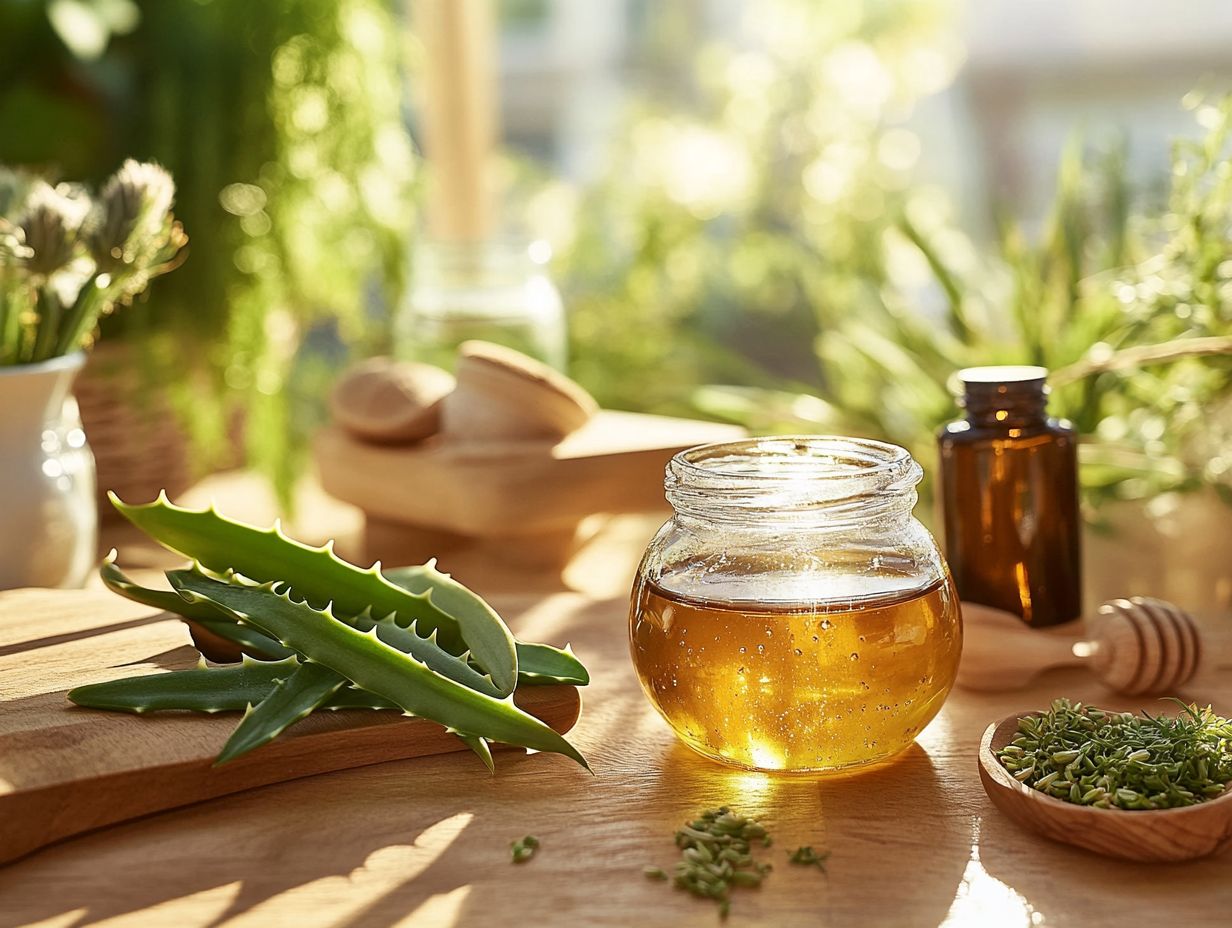
Using natural remedies for skin infections requires a clear understanding of proper application methods. This ensures safety and effectiveness.
By following guidelines and combining the right natural ingredients, you can enhance your wound care routine.
Application Methods and Precautions
When using natural remedies for skin infections, mastering proper application methods is essential. Correctly applying remedies enhances their effectiveness.
Select the right remedy for your specific infection type. Tea tree oil is popular for its antibacterial properties; just remember to dilute it with a carrier oil.
Always perform a patch test on a small area of skin before applying any remedy. Stick to dosage recommendations, like using diluted tea tree oil once or twice daily.
If you face severe infections or if symptoms persist, consulting a healthcare professional is crucial to prevent complications.
Preventing Skin Infections Naturally
Preventing skin infections naturally is within your reach. By embracing a blend of good hygiene habits, taking care of your skin, and thoughtfully incorporating effective natural remedies into your daily routine, you can easily build a strong defense against infections.
When you prioritize prevention, you not only lower your risk of infections but also improve your overall wound care, keeping your skin healthy and vibrant.
Tips for Maintaining Healthy Skin
Maintaining healthy skin is essential for preventing skin infections. Embracing effective hygiene practices along with natural remedies can be a game changer. Simple daily habits can significantly enhance your skin health and reduce the chances of infections.
For instance, regular cleansing is key to getting rid of dirt and excess oil that can invite bacteria. Experts recommend washing your face twice daily with gentle, natural cleansers to ensure you don t strip your skin of its vital oils.
Moisturizing is also important for keeping your skin hydrated. Those who apply a suitable moisturizer after cleansing are much less likely to suffer from dryness and irritation.
Incorporating natural remedies such as aloe vera or tea tree oil can offer added antibacterial benefits. For those looking for more options, consider 5 herbal remedies for skin conditions. Studies show that good skin care can lower your chance of infections by up to 30%, highlighting how significant these practices are for your overall skin health.
Frequently Asked Questions
What are some common skin infections that can be treated with natural remedies?

Some common skin infections that can be treated with natural remedies include acne, eczema, fungal infections, and bacterial infections such as cellulitis.
What are the benefits of using natural remedies for skin infections?
Natural remedies for skin infections are gentler on the skin compared to harsh chemical treatments. They also tend to have fewer side effects and can be more affordable in the long run.
Can natural remedies effectively treat severe skin infections?
It depends on the severity of the infection. While natural remedies can help with mild to moderate skin infections, severe infections may require medical treatment. It is best to consult a healthcare professional for serious cases.
What are some common natural ingredients used in remedies for skin infections?
Some common natural ingredients used in remedies for skin infections include tea tree oil, aloe vera, apple cider vinegar, garlic, and honey. These ingredients have antibacterial, antifungal, and anti-inflammatory properties.
Are there any potential risks or side effects of using natural remedies for skin infections?
Some natural remedies may cause allergic reactions or skin irritation in some individuals. It is important to perform a patch test before using any new product and to discontinue use if any adverse reactions occur.
Can natural remedies prevent skin infections from occurring?
Natural remedies can help maintain healthy skin and boost the immune system, which may help prevent some skin infections. However, it is still important to practice good hygiene and seek medical treatment if an infection does occur.
Act now to protect your skin from infections!


